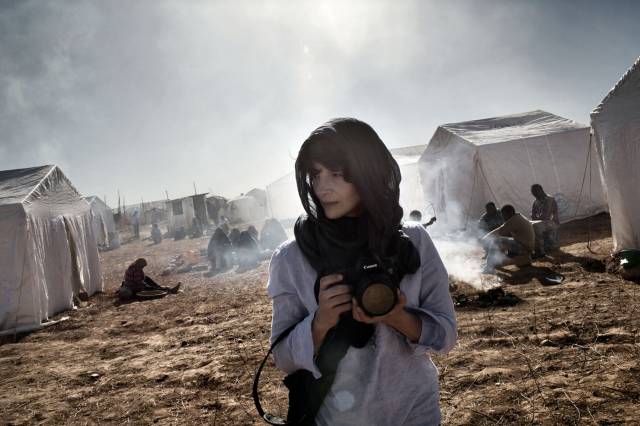

Norwegian filmmaker Erik Poppe switches up gender roles in his film 1,000 Times Goodnight. In yet another striking and powerful performance, Juliette Binoche stars as Rebecca Thomas, a highly respected war photographer who, after a near-death car bomb incident, must deal with the repercussions of her passion on her home life. The opening scene alone is enough to spark lengthy discussion. At an Afghan burial site, women in hijab pray around an open grave. They are preparing a young female suicide bomber for her soon “martyrdom.” Rebecca, also in head-scarf and dress, furtively documents as the woman climbs out of her grave and is brought to be bathed and dressed in bombs. It is clear that the women trust Rebecca. They allow her in the room and, when she asks, they allow her in the car as it drives into Kabul. When Rebecca exits the car, she hesitates. Where is her line of morality? An age old question in photo-journalism. Ultimately, she calls out to warn others of the impending explosion, but it is too late. She and the surrounding civilians are caught in the blast. And before surrendering to the pain of her popped lung, Rebecca snaps two more photographs of the disaster.
This dramatically gripping sequence is also a beautiful characterization of Rebecca. She is dogged; an unafraid, relentless journalist with questionable ethics. And this remains true as we see Rebecca at home after her injury, uneasy and out of place as a mother and wife in the quiet Irish countryside. It is not a story about the wars between countries, but one of the battles faced at home when love is not enough to reconcile ambition with responsibility. What is so fascinating is that those questions brought up in the opening sequence do not disappear; instead, they are transposed into Rebecca’s home life. Is she sacrificing individuals (those surrounding the car bomb, her children, her husband) for the greater good? At what point is it no longer worth it?
For most of the film, we are not on Rebecca’s side. She puts herself and her children in danger and neglects her family with little consideration to the consequences. It is clearly not worth it. And it is to the credit of Poppe and Binoche that she remains an engaging and sympathetic character despite the fissure in her priorities. 1,000 Times Good Night is a film that could not exist without its myriad profound performances. The pain and struggle of each and every family member is deeply felt. Rebecca’s husband Marcus, (Game of Thrones’ Nikolaj Coster-Waldau) is the familial rock at the end of his patience. But his pleas and those of their children are not enough to entice Rebecca away from conflict. The gender-twist on a classic story of “paternal neglect” adds a brilliant and complex layer. Were Rebecca’s character a man, would he be merely respected? Honored for his bravery and accepted as a less-than-part-time dad? Would he have the same moral struggles when documenting the martyr preparation of a teenage girl? Would he have to worry about attending his daughter’s high school performance?
These questions and many others arise as we are carried through the complex and heart-wrenching world of 1,000 Times Good Night and it is up to the audience to consider them. The film is a thought-provoking and beautiful experience that begins a dialogue about gender roles in family, war, and pursuing one’s passions.